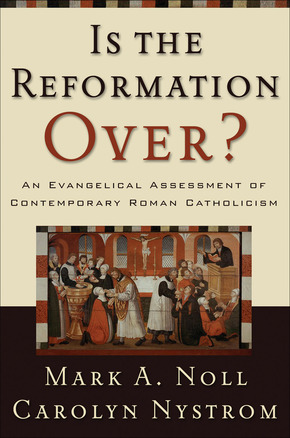Is the Reformation Over?
 Mark A. Noll and Carolyn Nystrom, Is the Reformation Over?: An Evangelical Assessment of Contemporary Roman Catholicism (Baker Academic, 2005), 272 pages, ISBN 0801027977.
Mark A. Noll and Carolyn Nystrom, Is the Reformation Over?: An Evangelical Assessment of Contemporary Roman Catholicism (Baker Academic, 2005), 272 pages, ISBN 0801027977.
“Is the Reformation Over?” This is the question raised in a recent book by Mark Noll and Carolyn Nystrom. In this work, the authors do not attempt a “final” or “universal” assessment of Roman Catholicism” (13), instead their principle goal is an evangelical assessment of contemporary Roman Catholicism within primarily North America, with special attention given to the dramatic changes that have taken place since the Second Vatican Council (13). Understandably, then, there are large segments of Roman Catholic life and history that are not addressed in this work. As a secondary goal they seek to “provide evangelical interpretations, grounded in both classical Christian theology and the broad history of Christianity, of what we see in the contemporary Catholic Church” (14).
This exceptionally well researched book begins with an overview of the developments between Catholicism and Protestantism over the past fifty years. They note the strategy of Billy Graham and his adjustments over time as he sought to work more ecumenically with Roman Catholicism. Additionally, they offer numerous examples of evangelical individuals and organizations 50 years ago and how their reactions to Roman Catholicism ranged from deep hostility to mere suspicion, and the changes they have gone through over the decades, becoming more and more amenable to the idea that Roman Catholics are genuine brothers and sisters in Christ.
The second chapter chronicles the relationship of different groups from the time of the Protestant Reformation to the present. As before, many examples are provided that serve both as documentation and as illustration. “So Why Did Things Change?” This is not only the logical question from the preceding, but it also serves as the title for chapter three. In short, they suggest that things have changed because “God willed the changes to take place” (59). The authors see the change from hostility to friendship as the work of Divine providence, and hail it as a unity sent by God. They note significant changes within the Catholic Church, especially since Vatican II. These changes lead evangelical theologian David Wells to conclude that Protestantism must, therefore, revise its analysis of Catholic doctrine as most of it is now “obsolete” (60).
The book continues as it follows a number of the “Ecumenical Dialogues” since the time of Vatican II. These conversations have occurred among a wide range of groups, including Anglicans, Pentecostals, Disciples of Christ, Baptists, and Reformed churches, just to name a few. They continue by examining the “Catechism of the Catholic Church (chapter five), and provide a truly exceptional summary of the Catechism and its teaching. This is significant because the Catechism is “the official teaching of the Catholic Church,” and therefore it “speaks (officially) for everyone within the church” (116).
Category: Ministry, Spring 2008


